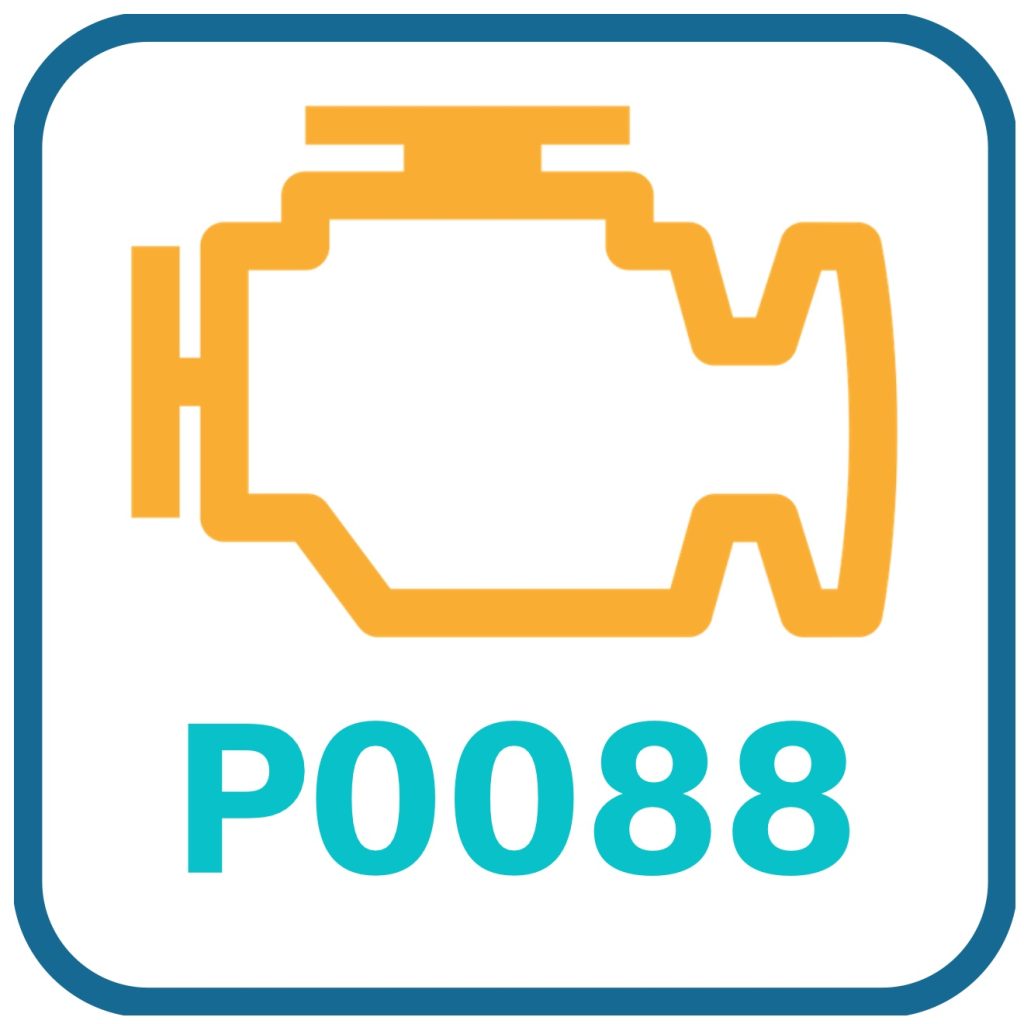P0088 is a common OBD2 trouble code. In layman’s terms, it indicates a problem with the fuel system. Specifically, if the PCM (powertrain control module) detects a too-high fuel rail pressure, it will set the P0088 trouble code.
While P0088 is a generic code, repair steps will vary depending on who made the vehicle, the model year, and how it regulates fuel pressure.
P0088 Definition: Fuel Rail/System Pressure – Too High

The P0088 code is a generic powertrain code that indicates a fuel pressure issue. This code is set when the PCM detects too much pressure in the fuel system.
Fuel Rail/System Pressure
The purpose of the pressure monitoring system is to help the engine run by monitoring the fuel pressure from the fuel injection system. Too much fuel can lead to just as many problems as no fuel.
Too High
If the fuel pressure is too high (the voltage value coming from the fuel pressure sensor is over the maximum value), it signals the PCM to display code P0088. Several components make up the fuel system. If any of them are faulty, it could cause a code P0088.
The main components that can fail and cause P0088 are the fuel pump, fuel pressure regulator, and fuel pressure sensor. Knowing how your vehicle’s fuel pressure is regulated can help you figure out the faulty component.
There are two ways that an engine can have its fuel pressure regulated.
- The first way is to use a fuel pressure regulator, which returns the extra pressure to the fuel tank.
- The other way is that the fuel pressure is regulated by the fuel pressure sensor, as it works with the PCM. The fuel pump can adjust to the needs of the engine directly, with no regulator needed. The fuel pressure sensor signals the pressure in the fuel rail to the PCM. If it’s not working correctly, the engine may stall or run rough.
P0088 Symptoms
There will almost ALWAYS be symptoms associated with P0088 if the fuel pressure is incorrect. There may not be any symptoms if the fuel pressure sensor is bad.
Here are the common symptoms associated with P0088:
- Slow/no start
- Decreased fuel mileage
- Misfiring (you’ll likely see code P0300, focus on P0088 first)
- Fouled spark plugs
- Stalling
- Black exhaust smoke
P0088 Causes
Here are the most common causes of P0088:
- Bad fuel pressure regulator
- Bad fuel pressure sensor
- Bad fuel pump
- Wiring issues at the fuel pressure sensor
- PCM
P0088 Diagnosis

While several things can cause a P0088 code, here’s a good order to diagnose them:
Inspect the Fuel Pressure Sensor Wiring
Start here (particularly if your vehicle is running fine).
Take a look at the fuel pressure sensor wiring. Make sure that it is not burnt, cracked, or frayed. Due to its location, damage to the harness is very common. It’s not uncommon for a rodent to nest around the intake, particularly in the wintertime.
Make sure that the harness is plugged into the sensor tightly and that there are no damaged pins inside the connector. If there are, you’ll need to repair or replace the harness.
Check Fuel Pressure
Be careful when checking the fuel pressure. It’s always best to do it with the engine cold. Make sure you have a fire extinguisher ready in case the fuel sprays. Do not connect or disconnect the fuel pressure gauge with the engine on.
The next course of action when diagnosing P0088 is to test the actual fuel pressure at the fuel rail. You’ll need a manual fuel pressure testing gauge. That’s not a tool that most Shadetree mechanics have, you can usually rent one or borrow one from the local parts store.
You’ll need to look up the exact fuel pressure for your vehicle and engine combination. If the fuel pressure checks out, you likely have a bad fuel pressure sensor.
If the fuel pressure is too high, you’ll need to replace the fuel pressure regulator.
Check the Fuel Pump
Using a multimeter, check the resistance of the fuel pump by connecting the positive lead to the positive terminal on the pump and the negative lead to the negative terminal.
